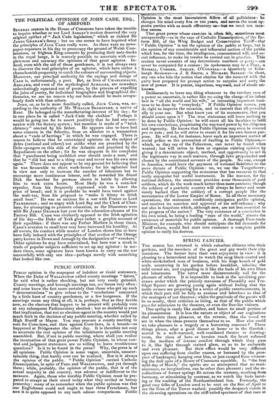PUBLIC OPINION.
PUBLIC opinion is the scapegoat of indolent or timid statesmen. When the Duke of WELLINGTON called county meetings " farces," he said what is rather shocking, but not very easily gainsaid. County meetings, and borough meetings too, are farces very often : and none know the fact more certainly than those who get up such " demonstrations" to give colour to the " resolutions concocted by a little knot of country gentlemen, or a few burgesses. If the meetings mean any thing at all, it is, perhaps, that as they decide now, so the electors that happen to be present will probably vote at any subsequent Parliamentary election : but so doubtful is even that implication, that not an election-agent in the country would put much faith in the decision of any public meeting, whether called by High Sheriff or Mayor. You may procure a county meeting to vote for Corn-laws, and then against Corn-laws, in a breath—as happened at Bridgewater the other day. It is therefore not easy to ascertain the real opinion of the inhabitants in public meeting assembled. But, if not in public meeting, where shall you realize the incarnation of that great power Public Opinion, to whose con- trol and judgment statesmen are so willing to leave troublesome questions ? Is it to be found in the press? Why, the press is of all opinions. Public Opinion is some vague, uncertain, unascer- tainable thing, that hardly ever can be realized. Nor is it always the opinion of the public. " Public Opinion " carried Catholic Emancipation, in spite of PEEL and WELLINGTON, and yet through them ; while, probably, the opinion of the public, that is of the actual majority in the country, was adverse or indifferent to the measure. Again, those who worship Public Opinion must be pre- pared to accept as their creed today what they reviled as heresy yesterday: many of us remember when the public opinion was that one Englishman could and ought to beat three Frenchmen, but now it is quite opposed to any such odious comparisons. Public Opinion is the moat inconsistent fellow- o$ all politicians.: he changes his mind every five or tea yeast, and serve& the most op- posite parties with as much effrontery aa-,—Mat we. need not. men- tion name& That great power whose exercise= is often, felt,, agmetimea most. unexpectedly—as in the case of Catholic Emancipation, of the Re- form Bill, of the Whig Budget and Conservative Tariff—that " Public Opinion " is not the opinion of the public at large, but is the opinion of any considerable and influential section of the public which has, for the time, the intelligence, concentrated will, and so- cial influence, to make its resolve be carried out in practice. This section never consists of any determinate numbers or party—can never be computed for a census ; its spokesman may be a PEEL, a RUSSELL, COBDEN, ASHLEY, O'CONNELL-a Quarterly or Edin- burgh Reviewer—a J. B. SMITH, a MICHAEL. SADLER- short, any one who hits the notion that obtains for the moment' with the party best prepared for prompt action to surprise and carry the seat of power. It is potent, imperious, wayward, and of abode un- known.
Deliberately to leave any thing whatever to the tutelary care of a power so uncertain, is rather like ref, osing the charge of an infant heir in "all the world and his wife," or intrusting important busi- ness to be done by " everybody." If Public Opinion comes, you. do right to improve the occasion, and to convert that all-powerful ally to your use. But what know you of its movements, that you should count upon it ? The true statesman will leave nothing to be done by Public Opinion: he will exert all his faculties to fulfil his own convictions, propitiating the wayward power by his diligence and ingenuity. He knows that Public Opinion may even be created pro re nata ; and he will strive to create it for his own honest pur- pose. He will not, for instance, leave such an important matter of social police as the prevention of duelling to. Public Opinion,— which, as they say of the Policeman, can never be found when wanted ; but will strive to form or organize existing opinion by. giving it a determinate object, method, and opportnuity to act in the legitimate way in such matters, through laws propounded and chosen by the constituted servants of the people. No one, except in America, would leave the payment of national, liabilities to the mere dictate of Public Opinion : no, we use the Taxgatherer ; Public Opinion supporting the statesman that has recourse to that really unpopular but useful instrument. In like manner, for the national defence, the statesman provides some thousands of paid soldiers, which do the work much better than Mere patriots ; though the soldiery of a patriotic country will always be better and more surely backed than the soldiery of a corrupt people like the mercenaries of the Lower Empire of Rome. In all these necessary operations, the statesman confidently anticipates,public opinion, and receives its sanction and approval of his self-reliance : why not also in functions which, although new, are not less essential to the progress of the nation ? The very existence of a conviction in his own mind, he being a leading "man of the world," attests the existence of materials for public opinion. A thorough Free-trade Minister, for example, who should• anticipate the full demands for Tariff-reform, would find start into existence a complete public opinion to ratify his decrees.


























 Previous page
Previous page